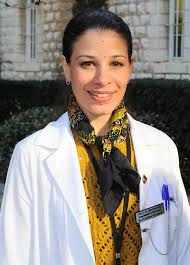About us
The
Inherited Metabolic Diseases (IMD) Program aat AUBMC is the first and only comprehensive program for inherited metabolic disorders in Lebanon and many countries in the region. We provide clinical evaluation, metabolic diagnostic investigations and treatment for babies, children, adolescents and adults who have inherited metabolic diseases (also known as inborn errors of metabolism). We have diagnosed and treated more than 5000 patients suffering from IMD during the past 25 years.
Our team includes pioneer specialists in Lebanon, who carry the knowledge and experience of 25 years of practice in the field of inborn errors of metabolism, offering a state-of-the-art, comprehensive joint care for the IMD patients:

| Dr Pascale Karam, Head of Inherited Metabolic Diseases program, Associate Professor of Clinical Pediatrics and Inborn Errors of Metabolism, Associate to the Department of Biochemistry and Molecular Genetics at the American University of Beirut- President of the executive committee of the Lebanese National Registry for Rare and Metabolic Diseases.
|

| Mrs. Abir Noureddine Barhoumi, Pediatric and Inherited Metabolic Diseases Dietitian, Assistant Director for Clinical Nutrition at the American University of Beirut Medical Center.
|
Diagnostic metabolic tests can be performed at the Department of Pathology and Laboratory Medicine-Clinical Chemistry Laboratory at AUBMC
We provide, as well, a multidisciplinary approach to all IMD patients, in collaboration with other highly specialized programs at AUBMC (such as neurology, psychology, cardiology, ophthalmology ...).
Our Mission
To provide the best possible care including clinical evaluation, metabolic diagnostic investigations and treatment for babies, children, adolescents and adults who have inherited metabolic diseases (also known as inborn errors of metabolism).
Services and Procedures
We have all the required expertise to diagnose and treat a wide variety of inherited metabolic diseases:
- Inherited metabolic disorders detected by newborn screening
- Aminoacid disorders, such as: phenylketonuria, tyrosinemia, urea cycle defects, maple syrup urine disease, homocystinuria, etc…
- Organic acid disorders, such as: methylmalonic acidemia, propionic acidemia, isovaleric acidemia, etc…
- Mitochondrial diseases
- Lipid Acid disorders/Fatty acid oxidation defects
- Lysosomal storage disorders, such as: Mucopolysaccharidosis, Gaucher disease, Pompe disease, Fabry disease, etc..
- Glycogen storage disorders
Frequently asked Questions:
What are Inherited Metabolic Diseases?
Metabolism refers to a series of chemical reactions that happen inside our cells to produce energy for the body, by converting one substance to another. Inherited Metabolic Diseases (also known as inborn errors of metabolism) are genetic diseases caused by the disruption of a metabolic pathway in the body leading to serious health problems.
When metabolism goes wrong, this can result in:
-
Buildup of toxic substances in different important organs like brain, heart, liver, bones, etc… and/or
-
Lack of energy production or a defect in energy utilization by the body
What are the symptoms of Inherited Metabolic Diseases?
Inherited Metabolic Diseases can cause a variety of symptoms:
-
Neurological: psychomotor delay, myopathy, neuropathy, epilepsy, intellectual disability, autism, etc…
-
Digestive: persistent nausea and vomiting, protein or sugar aversion, chronic diarrhea, etc…
-
Cardiac: cardiac muscle dysfunction, hypertrophy or dilatation.
-
Vision disturbance: like retinal deposits, bilateral cataract, etc...
-
Hearing deficit
-
Bone diseases: like rickets, scoliosis and bone deformities
-
Liver diseases: like acute or chronic dysfunction, cirrhosis
-
Failure to thrive: poor weight gain, short stature
At what age can IMD start?
Symptoms of IMD can start at any age! It can affect babies, children, adolescents and even adults.
How can we diagnose an IMD?
The IMD specialist can diagnose an IMD:
In newborns: when a baby has a positive neonatal screening, which is a blood test that can be offered at birth to all babies.
At any age: when a patient presents with one or more suggestive symptoms of IMD.
After a thorough clinical evaluation, the IMD specialist will ask for specific metabolic investigations. These tests can include mainly highly specialized blood and urine metabolic tests which can be performed at the AUBMC Clinical Chemistry Laboratory.
What is the treatment of IMD?
Some IMD can be treated by a diet restricting the toxic substance that cannot be metabolized by the body and/or providing vitamins and medications that can help the metabolism function properly.
Management of IMD is provided by a skilled IMD team including the IMD Dietitian and the clinical specialist.
Research
We abide by the Institutional Review Board (IRB) at the American University of Beirut (AUB) regulations for research. We conduct many research projects involving inborn errors of metabolism.
Contact us
Inherited Metabolic Diseases Program:
imdp@aub.edu.lb
Dr Pascale Karam - Director of IMD Program
Mrs Abir Barhoumi - MSc. LD., IMD Program Dietitian
-
E-mail:
an04@aub.edu.lb
-
Location: AUBMC Private Clinics, Sawwaf Building, 3rd Floor.
-
Telephone: 961 1 350 000 ext. 7950 (for scheduling appointments),
